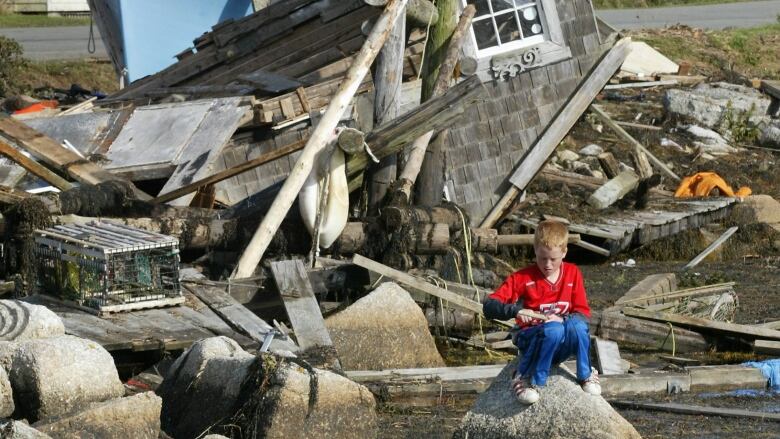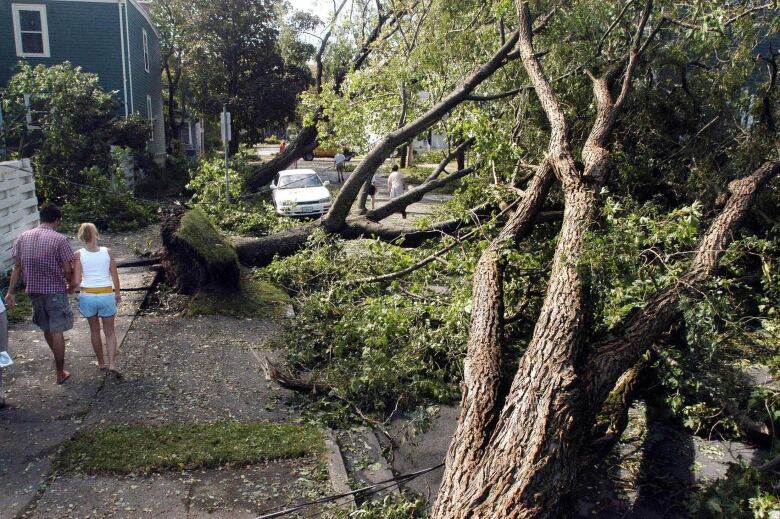Is Canada prepared for a Hurricane Harvey disaster?

The big hurricanes that we see and hear about on the news usually happen in the area around the Gulf of Mexico. The warm waters in the Gulf mean high winds and big storm surges. But they aren't limited to that stretch of the southern coast. Hurricanes can reach much further north, even crossing into Canada.
Athena Masson is a meteorologist and PhD candidate at the University of Toronto. She is currently in St. Augustine Florida studying Atlantic hurricanes.
This interview has been edited for length and clarity.
Tim Caulfield: How often do we see hurricanes in Canada. Really it's not an uncommon phenomenon that happens in Canada.
Athena Masson: On average Canada is impacted by a hurricane at least once, maybe even twice a year. However, by the time these systems get to Canada they are not known as hurricanes. They are not fully tropical in origin. So once they reach into the higher latitudes and longitudes they undergo a transformation known as 'extratropical transition', but it can still maintain the winds of a hurricane. By the time these hurricanes reach Canada they can be 10 times larger than what they were in their tropical form. So really even though it is not a fully tropical, known as a hurricane system, really it's still a hurricane by the time it does get to Canada.
TC: What areas in Canada are at the greatest risk?
AM: Atlanta Canada, especially Nova Scotia and Newfoundland in particular. And these are usually the final stops, where hurricanes impact before they're pushed further out into the Atlantic.
Nova Scotia in particular has been impacted numerous times by hurricanes. In fact they received hurricane Juan in 2003, which was the most powerful hurricane to have crossed into Canada. That was a Category 3.

TC: How are these hurricanes different from the ones that are hitting the southern United States by the time that these hurricanes reach into Canada?
AM: They are weaker in wind speeds particularly. However they are stronger when it comes to their moisture content. This goes back to the process of extratropical transition. So by the time that these hurricanes do impact Canada it's mostly a huge rainstorm and not much of a windstorm. So Canada will not really see Category 4, Category 5, or the wind speeds that we've seen with Harvey as it came ashore. But Harvey is a great example of the rain that Canada could potentially see with tropical systems that head into Atlantic Canada.
TC: We've been hearing a lot about how Texas knew this storm was coming but made choices that arguably made the damage worse. How well prepared are we here in Canada for major storms?
AM: I don't think anyone will ever be 100% prepared. Many Canadians have never experienced a hurricane. Most of the time if a hurricane does impact Atlantic Canada or elsewhere in Canada is that it's mostly a little wind storm or rain storm then moves off completely.
I do fear that if in the future another Hurricane Juan, for example, that impacted in Nova Scotia in 2003, that if another one of those came through, many Canadians would be very ill prepared because they really do not understand the full force of these tropical systems. If Harvey came along, and Harvey's been lasting for days in Houston, if Canada had a hurricane to last for days, emergency managers, government, population, they would really not be able to handle the situation currently as it stands right now in my opinion.
TC: Now I know it is difficult to point to climate change as a specific cause of these events but how do rising temperatures affect hurricanes?
AM: So after a devastation like Hurricane Katrina or Hurricane Harvey a lot of people would like to point to climate change for the reason why we received this particularly dangerous storm. And we have to be careful with this. One outlier of a storm doesn't necessarily mean that for the rest of the hurricane season or the future we will be seeing hurricanes on this scale.
But yes, we can all agree that not only atmospheric temperatures but also ocean temperatures are on the rise. And this is a fact that we have seen as climatologists. The problem is that hurricanes thrive off of warm ocean waters. They need at least 26.5 degrees centigrade waters in order to evolve and to even form in general. So generally we look at the Atlantic hurricane season from June 1st to November 30th. These are when the oceans are prime and temperature and outside of that it's winter. We expect that the sea surface temperatures are supposed to lower. With climate change, on the other hand, we're not seeing extreme cold temperatures in the wintertime very much anymore. So the oceans may maintain its heat.
This is allowing us, in the past few years, to see hurricanes forming outside of the hurricane season. So what this means is that we can maybe see a year long hurricane season very similar to what the Northwest Pacific sees. It's a year round hurricane season instead of only confining our hurricane season to six months. So now we can maybe expect higher frequencies of hurricanes forming. And with higher frequencies we can then relate it to more impacts on land.
TC: How could rising temperatures affect the hurricanes that reach us?
AM: So hurricanes and sea surface temperatures are very bad scenario for Canada. This could mean that Canada could be experiencing very soon first major hurricanes to impact the coastlines. So, true, Hurricane Juan was an outlier as a Category 3, but we could see similar storms coming back Category 3 or even stronger because with warm sea surface temperatures it's not confined to the tropics. Instead it's now moving upwards. So, yes, you guys may be having a wonderful time at the beach over in Canada because the waters are becoming warmer. But, be warned, warmer temperatures right off the coast of Canada means that hurricanes could definitely survive.
Special thanks to WFCF and Daniel McCook in St. Augustine, Florida.












_(720p).jpg)


 OFFICIAL HD MUSIC VIDEO.jpg)
.jpg)



























































































